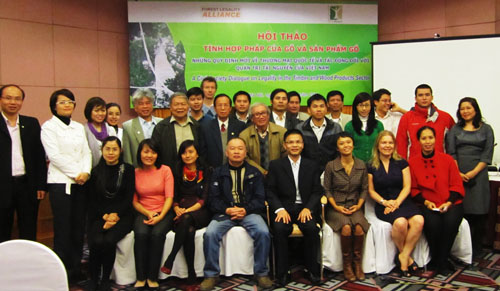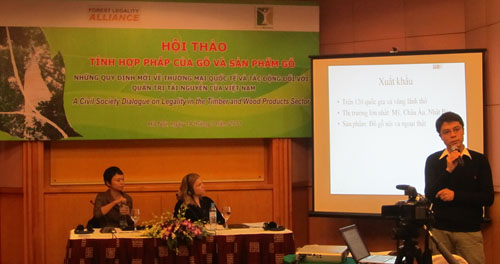In Vietnam, management of wildlife diseases has garnered attention from both the State and the public. This is evident through a comprehensive system of regulations addressing diseases that can be transmitted from wildlife to humans spanning a range of documents, from laws to decrees and circulars. However, despite these efforts, the practical implementation of wildlife disease management still encounters numerous challenges and shortcomings.

Villages urged to prevent illegal logging
Hanoi — The legality of timber and wood products should be promoted to curb illegal logging, according to a meeting in Ha Noi yesterday. The conference, held by the Forest Legality Alliance (FLA) and People and Nature Reconciliation (PanNature), also called for concerned agencies, including the Government, businesses and households, to ensure that only legal timber is used.
To Xuan Phuc, a programme analyst from Forest Trends, an international non-profit organisation promoting sustainable forest management, said the Vietnamese wood sector had been challenged by the new regulations in the big export markets, including the EU Forest Law Enforcement, Governance and Trade (FLEGT) Voluntary Partnerships Agreement and the US’s Lacey Act.

Dr. To Xuan Phuc of Fores Trends presenting at the legality issues and the timber and wood products industry in Vietnam.
Photo: PanNature.
He said the regulations could affect Viet Nam’s wood business as they asked companies exporting wood products to Europe and the US to provide documents proving that all timber was legally logged. Documents must state the timber’s scientific name, the quantity being exported, the import value, the country of origin or come with an EU FLEGT certificate.
Companies found selling products made from illegitimate timber sources would face severe penalties, such as confiscation of the goods, heavy fines or possible jail time for involved parties. “Eighty per cent of wood materials used for Viet Nam’s exported wood products were imported from 600 different resources in 26 countries and territories, equivalent to 4 to 5 cu.m annually or US$1 billion. The huge amount of imported material makes it difficult for the country to control the origin of the wood,” he said.
Andrea Johnson from the FLA said illegal trading and exploitation of wood had been on the rise globally, and was becoming a serious issue affecting climate change. She said illegal exploitation undermined forest management and harmed communities.
“Around $10-15 billion is lost annually due to the illegal exploitation of wood. Illegal logging and trade has also generated conflicts, abused people’s rights and even incited violence,” she said.
According to Johnson, volunteer policies were not enough to prevent the situation, prompting countries to create a legal framework, such as the Lacey Act Amendments of 2008 in the US and the EU Illegal Timer Regulations 2010.
Nguyen Hai Ly, an advisor from the European Forest Institute, FLEGT Asia to Viet Nam, said the EU Timber Regulation, aimed to ensure that no illegal timber is sold in the EU market, required companies to verify the origin of all wood.
“Viet Nam has been one of six countries participating in negotiations with the EU about the regulation to set up controls and licensing systems providing governments with guarantee of legality,” Ly said.
Phuc from Forest Trends said the Government had striven to complete negotiations with the EU on the Volunteer Partnership Agreement to prepare for the Lacey Act and the FLEGT, which take effect in March 2013. Viet Nam Timber and Forest Product Association’s Secretary General Nguyen Ton Quyen said wood exporting businesses should consider using material-saving technologies, which could save 15 per cent of wood materials annually.
“It is necessary to reduce input costs, including production lines, improving capacity and power-saving,” he said.

Photo: PanNature.
Viet Nam has 13 million hectares of forests, covering 39.1 per cent of its land. And it now has over 3,000 businesses that process and export wood products.
Last year, Viet Nam exported wood products to 26 countries and territories with a turnover of $3.4 billion. Its products have been sold in 120 countries and territories, with the US, the EU and Japan being the three biggest importers.
NOTES:
The above article is a news report about the recent event “A Civil Sociey Dialogue on Legality in the Timber and Wood Products Sector” co-organized by PanNature and Forest Legality Alliance at Melia Hotel, Hanoi, Vietnam on 14th March 2011. Please find below related materials presented in this event:
2. Overview of Legality Issues and the Timber and Wood Products Industry in Vietnam (Vietnamese)
By To Xuan Phuc, Forest Trends
3. US Lacey Act: A tool to fight illegal logging and promote better forest management
By Andrea Johnson, Forest Legality Alliance
4. The EU Timber Regulation & the VPA Process in Viet Nam
Felise Hai Ly Nguyen, European Forest Institute – FLEGT Asia
5. FLA Risk Assessment Tool
Fiona Mulligan, Forest Legality Alliance



